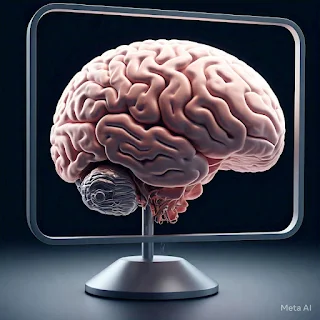The brain is a sophisticated organ that responds and processes information differently based on the activities we perform. Playing video games and reading books are two diametrically opposed activities that engage distinct brain processes. Let's examine the effects of each activity on the brain.
When reading books, the brain Reading stimulates several parts of the brain and is a cognitively stimulating activity.
1. Improved Mental Abilities Language Processing: The left temporal lobe, which is in charge of language comprehension, is activated when reading. Your brain interprets words, sentences, and meaning as you read.Visualization and Imagination: As you visualize the situations, people, and ideas that are discussed in the book, your visual brain becomes active.
2. Concentration and Memory Working Memory: Your brain retains and retrieves information while listening to a tale or debate, which improves short-term memory.
Concentration: Reading calls for prolonged concentration, activating the prefrontal brain, which governs focus and judgment.
3. Emotional Growth and Empathy Story immersion strengthens emotional intelligence and empathy by improving the brain's capacity to comprehend the feelings and viewpoints of others.
When Playing Games, the Brain Interactive video games in particular stimulate the brain in different ways compared to reading:
1. Enhanced Coordination and Reflexes Sensorimotor Skills: Games require quick reactions, improving hand-eye coordination and fine motor skills.
Faster Decision-Making: Action games, in particular, stimulate the amygdala and cortex, enhancing the speed of decisions.
2. Problem-Solving and Strategy Games often involve puzzles or strategies, activating the prefrontal cortex for planning, logic, and critical thinking.
3. Reward Systems and Dopamine Release The brain’s reward system is highly stimulated during gameplay. Winning or achieving objectives leads to dopamine release, creating feelings of pleasure and motivation.
4. Cooperative and Social Skills Playing multiplayer games improves cooperation and social skills, particularly in group settings. Evaluation of Cognitive Advantages
Although they use the brain in distinct ways, reading and gaming both provide substantial cognitive advantages. While gaming improves reflexes, decision-making, and problem-solving skills, reading fosters creativity, empathy, and intense concentration. A well-rounded mental workout that supports cognitive development and brain health can be achieved by combining the two activities in a balanced manner.
Games That Involve the Brain Actively and Their Cognitive Advantages Different kinds of games can activate different parts of the brain. The types of brain-boosting games and the cognitive abilities they improve are broken down below.
1. Games with puzzles Examples include crossword puzzles, Tetris, Candy Crush, and Sudoku.
Activated Brain Functions: Solving problems: Calls for strategy and rational thought. Recognizing patterns, shapes, and spaces is known as spatial awareness.
Advantages for the Brain: enhances logical reasoning, pattern recognition, and memory.
2. Games of Strategy Examples include StarCraft, Civilization, and Chess.
Activated Brain Functions: Strategic thinking and planning call for judgment and insight. Critical thinking and problem-solving skills include weighing several options and selecting the best one.
Advantages for the Brain: improves executive function (the capacity to prioritize and manage tasks), decision-making, and attention.
3. Games to Train the Brain and Memory Examples include Elevate, Brain Age, and Lumosity.
Activated Brain Functions: Memory Recall: Improves recall speed and working memory.
Focus & Attention: Success requires concentration.
Advantages for the Brain: increases processing speed, attention span, and short-term memory.
4. Role-playing and adventure games (RPGs) Examples include Final Fantasy, Skyrim, and The Legend of Zelda.
Activated Brain Functions: Exploration and Problem-Solving, Getting past obstacles and navigating new environments.
Emotional Engagement and Story Comprehension: Following plots and comprehending characters.
Advantages for the Brain: increases empathy, critical thinking, and creativity.
5. Shooter and Action Games For instance, Apex Legends, Fortnite, and Call of Duty
Activated Brain Functions: Hand-Eye Coordination, Accurate manipulation and rapid response. Making decisions quickly under duress is known as "quick decision-making."
Advantages for the Brain: enhances situational awareness, spatial reasoning, and reflexes.
6. Management and Simulation Games Examples include RollerCoaster Tycoon, SimCity, and The Sims.
Activated Brain Functions: Resource management includes planning and resource allocation.
Solving problems: Managing situations and results.
Advantages for the Brain: improves long-term thinking, organizing, and planning abilities.
7. Word games and education Examples include Words With Friends, Spelling Bee, and Scrabble.
Activated Brain Functions: Language and Vocabulary Skills, Creating words and comprehending definitions.
Advantages for the Brain: enhances word recognition, spelling, and verbal fluency.
In conclusion Different brain regions can be activated by playing a range of games, which enhances creativity, memory, coordination, and critical thinking. A well-rounded gaming regimen that includes puzzle, strategy, and action games can improve cognitive function overall.



Comments